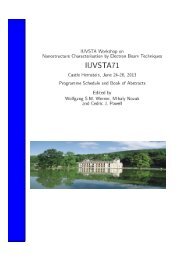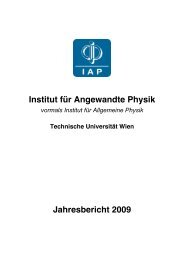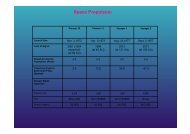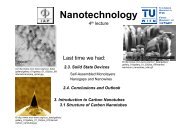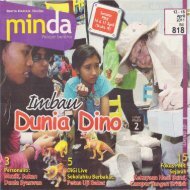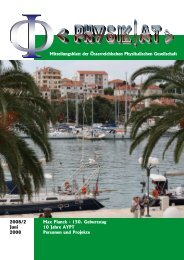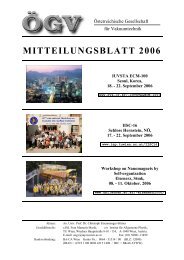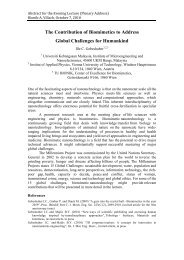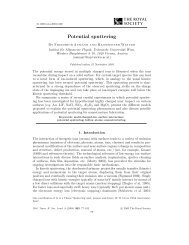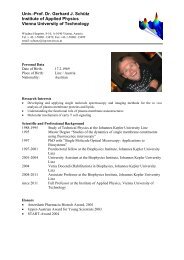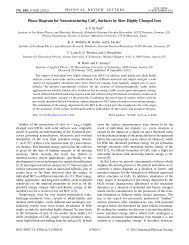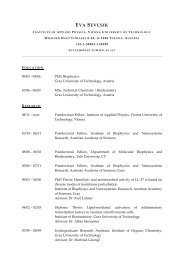nanoscience and society - IAP/TU Wien
nanoscience and society - IAP/TU Wien
nanoscience and society - IAP/TU Wien
Create successful ePaper yourself
Turn your PDF publications into a flip-book with our unique Google optimized e-Paper software.
----- --- -=-- ~<br />
...----z1F<br />
Institute for Technology Assessment <strong>and</strong> Systems Analysis (Germany) 339<br />
See Also: Center for Nanotechnology in Society (ASU); Design<br />
<strong>and</strong> Construction; Innovation.<br />
Further Readings<br />
Cagan, J. <strong>and</strong> C.M. Vogel. Creating Breakthrough Products:<br />
Innovation From Product Planning to Program Approval.<br />
Upper Saddle River, NJ: Prentice Hall, 2002.<br />
Friedman, T.L. "Oops. I Told the Truth." New York Times<br />
(October 17,2004).<br />
Nussbaum, B. "Redesigning American Business." Business<br />
Week (November 29, 2004).<br />
Ille C. Gebeshuber<br />
Vienna University of Technology<br />
Mark O. Macqueen<br />
Universiti Kebangsaan Malaysia<br />
Institute for Technology<br />
Assessment <strong>and</strong> Systems<br />
Analysis (Germany)<br />
The Institute for Technology Assessment <strong>and</strong> Systems<br />
Analysis (ITAS) was among the first research institutes<br />
investigating the societal dimensions of nanotechnology.<br />
This work started in 2000, partly motivated by an<br />
early study for the German Parliament via its Office<br />
of Technology Assessment, operated by ITAS. Current<br />
ITAS work on nanotechnology focuses on risk characterization<br />
<strong>and</strong> communication of nanoparticles <strong>and</strong><br />
ethical aspects of converging technologies. The mission<br />
of ITAS is much more broad, <strong>and</strong> covers issues such as<br />
sustainable development, energy systems analysis, <strong>and</strong><br />
sociology of risk.<br />
The Institute<br />
ITAS is a public-funded research institute of the Karlsruhe<br />
Institute of Technology. The mission of ITAS is<br />
creating <strong>and</strong> communicating knowledge at the many interfaces<br />
between science <strong>and</strong> technology <strong>and</strong> <strong>society</strong>. Its<br />
work focuses on environmental, economic, social, <strong>and</strong><br />
political-institutional issues.<br />
ITAS supports politics, science, business, <strong>and</strong> the<br />
general public in decision making on the basis of the<br />
best available knowledge <strong>and</strong> transparent assessments.<br />
For this purpose, ITAS applies <strong>and</strong> upgrades methods<br />
of technology assessment (TA) <strong>and</strong> systems analysis.<br />
Knowledge provided by ITAS can be characterized by<br />
the following aspects:<br />
Pragmatic Orientation. The Institute produces knowledge<br />
against the background of societal expectations,<br />
problems, <strong>and</strong> debates concerning technology. Relevant<br />
societal actors are involved in the research <strong>and</strong> communication<br />
process. Research results are integrated into<br />
different alternative options for action <strong>and</strong> shaping.<br />
Future Orientation. The Institute's research regularly<br />
includes a prospective part. The focus is on forecasting<br />
the consequences of human action, both as a foresight<br />
of sociotechnological developments <strong>and</strong> as an assessment<br />
of the future impacts of current decisions, taking<br />
into account specifically the uncertainties necessarily<br />
involved.<br />
Value Orientation. ITAS approaches the normative dimension<br />
of TA by analytical as well as by participatory<br />
means, involving applied ethics <strong>and</strong> social sciences. In<br />
particular, a model of sustainable development work<br />
has been developed by ITAS.<br />
ITAS focuses on the following research fields:<br />
Strategies of Sustainable Development. Based on the<br />
integrative concept of sustainable development, strategies<br />
for a variety of problems are developed <strong>and</strong> assessed,<br />
for example in the fields of mega-cities, l<strong>and</strong> use,<br />
<strong>and</strong> scarce materials.<br />
Energy-Resources, Technologies, <strong>and</strong> Systems. New<br />
technologies in the energy field are investigated with respect<br />
to their ecological, economic, <strong>and</strong> social impacts<br />
in the context of energy systems. Current focus is on the<br />
use of biomasses not competing with nutrition requirements,<br />
<strong>and</strong> on efficiency strategies.<br />
Key Technologies <strong>and</strong> Innovation Processes. Potentials<br />
<strong>and</strong> impacts of key technologies as well as unintended<br />
side effects are identified <strong>and</strong> characterized. Options for<br />
action concerning innovation, dealing with risks <strong>and</strong><br />
for public debate are developed. Focus is on nanotechnology<br />
<strong>and</strong> on communication technology.<br />
Knowledge-Based Decision Making in Society. Decision<br />
making in modern <strong>society</strong> is, on the one h<strong>and</strong>,<br />
more <strong>and</strong> more expected to be knowledge based, but on<br />
the other h<strong>and</strong> increasingly faced with far-ranging uncertainties.<br />
This dilemma is investigated in depth, <strong>and</strong><br />
strategies of dealing with it are developed.



